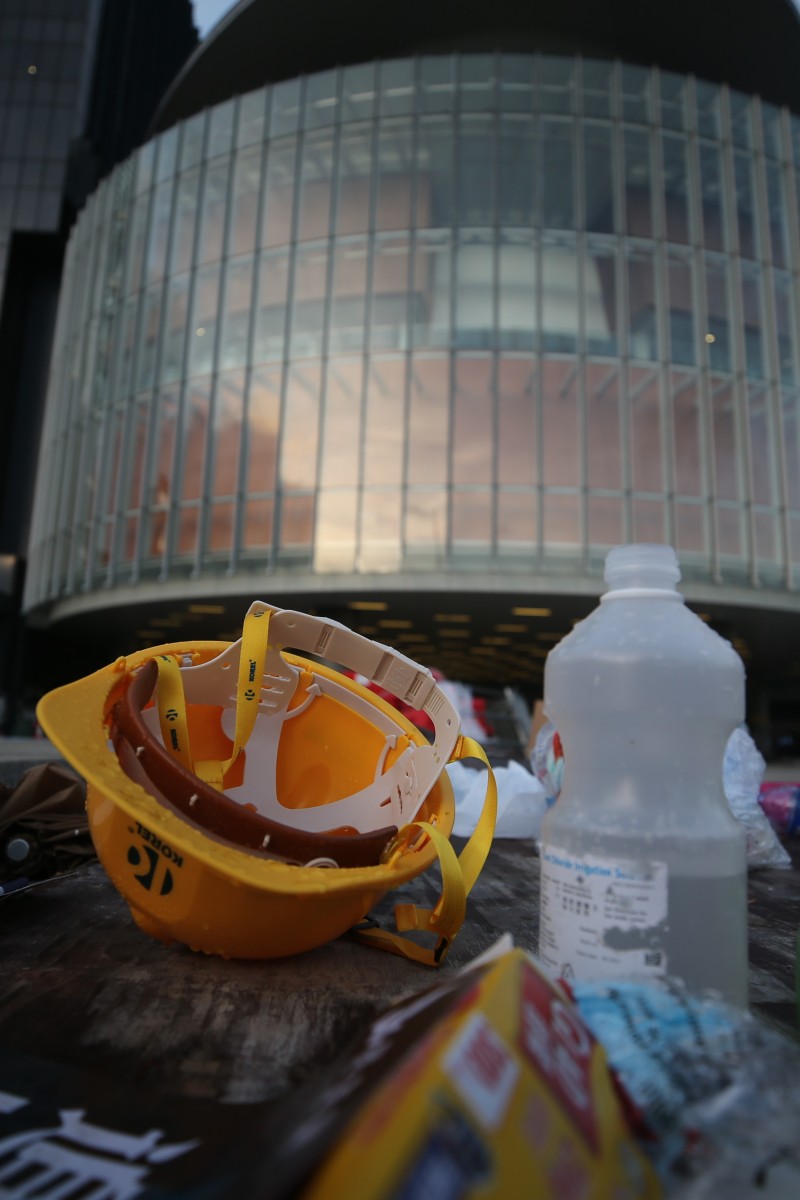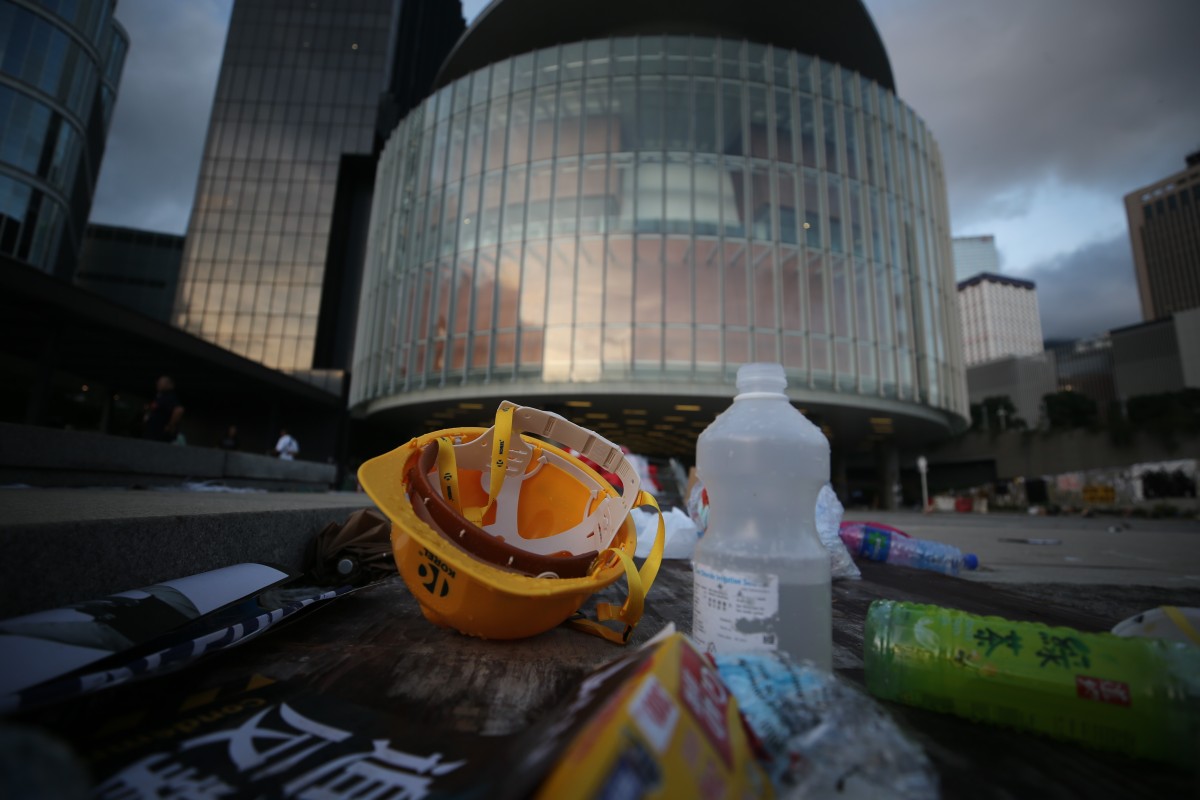
Hong Kong extradition law: Legco to remain closed for two weeks due to damage from storming by Hong Kong protesters on July 1
Hundreds occupied the legislative headquarters for about 12 hours on Monday as part of their 'anti-elab' protests against the fugitive bill
 Helmets, bottles and umbrellas are all left behind after protesters end their occupation of the Legislative Council.
Helmets, bottles and umbrellas are all left behind after protesters end their occupation of the Legislative Council. Meetings at Hong Kong’s legislative headquarters will be cancelled for the next two weeks due to damage done by protesters on the night of July 1.
Legislative Council president Andrew Leung Kwan-yuen, who expressed his sadness and deep regret over the incursion, said on Tuesday that the building’s entrance, meeting facilities and security system were vandalised during the incident, with crucial infrastructure brought down.
While the government’s headquarters has been closed temporarily for security reasons, forcing thousands of civil servants to work elsewhere, it said the Executive Council’s weekly meeting, which has been cancelled for the past two weeks, would still go ahead, but at Government House.
The area around the city’s main political hub, the Legco building in Admiralty, was calm on Tuesday, although the complex itself remained in disarray, and was sealed off by the police after hundreds of protesters occupied it for about 12 hours on Monday, staying until midnight, with some storming into the legislature itself.
Metal barricades, helmets, umbrellas, placards, broken glass and other rubbish, were strewn across the complex, while most of its metal fence had been ripped away.
After inspecting the Legco building for about an hour on Tuesday morning, Leung said a full restoration would take a long time to complete.
He said it would not be feasible for the council to hold meetings in rooms within the complex that were not damaged, or at other venues.
“Secretariat staff must first focus on resuming operations in Legco, so it’s not feasible for the council to hold meetings at other venues in the near future,” Leung said.
Hong Kong extradition bill: the July 1 rally on handover anniversary, as it happened
“Although some rooms in the Legco building are not damaged, the security system, power supply and fire alarm systems are down.”
Leung declined to confirm if computer hard drives and storage devices in the building were missing. “Many things are lost. We are still counting,” Leung said.
Leung also declined to comment on the police’s decision to leave the building on Monday evening, when protesters were trying to break in. “We left the decision of operations to police,” he said.
As of Tuesday, all members of the public, including cleaning staff, were banned from entering the premises.
After battering their way into the Legco complex, hundreds of protesters vandalised the interior and tore down portraits of the city’s political leaders.
They broke into the main chamber and sprayed slogans on the walls, covered Hong Kong’s official emblem with black paint, and draped a British colonial flag over the president’s podium.
When asked about the destruction of his portrait by protesters, Leung said he was “saddened and heartbroken”, but did not take it as a special message from the protesters.
“My portrait is simply a portrait … I don’t have time to think about the issue,” he said.
What happened at Legco on July 1 when protesters stormed the complex?
Speaking separately from Leung, the committee chairman Chan Kin-por suggested it could be possible to use Legco for the meetings.
“We are not sure about the meeting room’s condition,” Chan said, adding he was concerned with safety and the functions of the voting system in Legco.
Chan said he thought about moving the meeting outside Legco, but added there may be legal and technical constraints.
Students explain why they took part in the July 1 march
The secretariat of the Civil Human Rights Front, the organisers of the annual July 1 march, called on “friends who care and love Hong Kong” to stand in solidarity with protesters who stormed Legco on Monday, and said they sympathised with the tactics.
In a statement issued on Tuesday morning, the group said: “The students last night ... were actually taking a more courageous step than all of us.”
The front appealed to supporters of the movement not to disown their actions.
“The fight hasn’t ended,” the statement said. “Let’s fight against lies, cynicism, fear and the sense of helplessness in face of totalitarianism in our family, circle of friends and communities.”
Pro-establishment lawmaker Priscilla Leung Mei-fun, who went back to Legco to retrieve some documents on Tuesday morning, criticised the acts of violence and suggested those involved should hand themselves into police.
“This is our workplace, it’s wrong for them to vent anger this way,” Leung said, urging protesters to come forward and take responsibility for their actions.
Lawmaker Eddie Chu Hoi-dick said the police and the Legco secretariat were set to establish a temporary registration system later on Tuesday for people going in and out of the building.
“The police said it had become a crime scene, so they should be in charge of admission,” Chu said. “I didn’t argue with them because we all understand the situation now and we should give them some time to handle it.”
